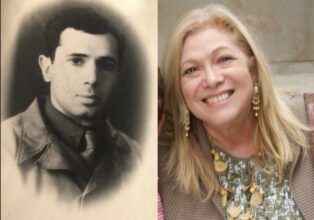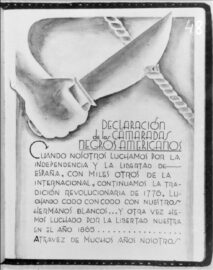Nancy Wallach is a member of the Abraham Lincoln Brigade Archive board (ALBA)and daughter of Hy Wallach, an American volunteer of Jewish-Polish descent that fought in the Spanish Civil War. The following interview took place on October 17th, 2024. Nancy spoke about her father’s experiences in the war and the legacy of the Abraham Lincoln Brigade that the archive works to preserve.
Hyman David Wallach, known as Hy Wallach, was born in Poland in 1914 but migrated to the U.S. as a teen. At 23, while working as a shipping clerk in the docks of New York, he became affiliated with the Young Communist League (YCL) and soon after volunteered to fight with the International Brigades.
A entry that Hy Wallach wrote down narrates his experience in Spain: “I fought in the battles of Brunete, Quinto and Belchite, Fuentes del Ebro and Teruel. I was selected to attend an Officer’s Training School but at the end of the first week, the entire school had to be sent to the front lines near Gandesa to stop the world’s first blitzkrieg, threatening to cut the Republic in two. In the battle of Gandesa – after eight days behind the lines – I was captured by Italian fascist troops. I was imprisoned more than seventeen months in San Pedro de Cardeña, a fascist concentration camp. The treatment was horrible. We not only stood up to it, but also developed a positive program. Many things were going on in San Pedro. We created a newspaper, The Jaily News edited by Sidney Rosenblatt and myself. I also helped to organize the “San Pedro University”, where we would get first-hand information on historical and contemporary events from our fellow prisoners, people involved in progressive and revolutionary movements all over the world.”

Hyman Wallach and his daughter Nancy Wallach
Hy Wallach returned to the U.S. in September of 1939 as part of a prisoner exchange. Back in the U.S. and up until his death Hy Wallach was a member of the Veterans of the Abraham Lincoln Brigade (VALB). In 1941, shortly after the attack on Pearl Harbor he enlisted voluntarily in the U.S. Army. He was deployed in North Africa, Sicily and the Italian Peninsula and fought with the U.S. Fifth Army under the orders of General Mark Clark. Returning to the U.S. Hy Wallach was awarded the Presidential Unit Citation for his bravery. During all his life up until his passing in 1986, Wallach kept his activist spirit and fought for labor rights and civil rights.
Dario Graziano: What is your personal relationship with the International Brigades and/or the Spanish Civil War? Is there any particular volunteer or episode that stands out to you?
Nancy Wallach: I’d like to start by sharing a link to my father’s biography which is listed in ALBA’s online directory of the Volunteers. In addition, here are some links to articles written by or about my father with regard to his service in Spain. They appeared in The Volunteer, ALBA’s magazine which was originally written by the Lincoln Brigade in Spain and continued by the veterans of the brigade after they returned.
One of my favorite memories is of my father who wrote to my then two year old sister when he was overseas in the Fifth Army explaining why he went to Spain to fight fascism, and (like so many of the Lincoln Vets) why he was continuing the good fight in the Second World War, which was why he could not be there for her birthday that year.
My father was frequently asked, as were so many of the volunteers, how he was able to withstand the hardships and deprivations on the Aragon front, and later the torture in the fascist concentration camp for International Brigade prisoners, San Pedro de Cardeña. He replied that he was a communist, and that he got his strength from his belief in a future of “singing tomorrows”, which was a phrase from a secret diary kept smuggled out by one of the executed communist leaders of the French resistance.
As a daughter of a Volunteer I saw how my father’s sacrifices were not acknowledged, but rather persecuted. After the VALB was placed on the Attorney General’s list of Subversive Organizations The House Un-American Activities Committee blacklisted the names of all veterans of the Lincoln Battalion, including my father.
Another precious memory I have is when I was invited to speak in Spain at the site of the former concentration camp where my father was imprisoned. The people I met from the Families of the Disappeared and Assassinated of Burgos expressed so much warmth and solidarity. There I saw first-hand how much my father’s sacrifices had meant.
Dario Graziano: How does ALBA keep the memory of American volunteers in the Spanish Civil War alive?

Illustration form the XV Brigade Book (RGASPI archive)
Nancy Wallach: ALBA has established Teaching Institutes throughout the U.S. which provide educators with lesson plans and resource materials on the Spanish anti-fascist war, the second republic and the International Brigades. They also organize an annual essay contest for students on a pre-collegiate, undergraduate and graduate level on these topics. ALBA also publish The Volunteer, which has been in print continuously since it was first published by the Veterans of the Abraham Lincoln Brigade in 1939. They are currently running a film series about the Spanish Civil War with online breakout sessions. ALBA also supports contemporary organizations who continue the activist tradition of the veterans in areas such as human rights and climate change. As a board member, I host a monthly book group on historical as well as contemporary Spanish topics. Participants from our sister organizations in Spain, Canada, the UK and Ireland join these discussions. ALBA’s award winning website makes resources as the Tamiment Library available to scholars, educators and students. This extensive archive hold personal papers and memorabilia of numerous Spanish Civil War volunteers, like letters, posters, notes and pamphlets. We are also working on establishing a memorial plaque at the University of Berkeley for Robert Merriman, the heroic commander of the Lincoln Brigade.
Dario Graziano: Are internationalism and anti-fascism still important today? How is ALBA a leading voice in promoting those values in America and the world? And what other values of ALB volunteers can we learn from today?
Nancy Wallach: The issues people faced in the United States election sadly bear out the relevance of anti-fascism today. We faced the threat of our votes being overturned by an candidate who threatens mass deportations and turning the military on the opposition, just like what happened to the Second Spanish Republic in 1936. ALBA recognized this threat by awarding this year’s Puffin Award to a non-partisan youth-led organization called 18by Vote, that helps young and rising voters understand how, when, and why to vote.
One of the most important lessons the brigade volunteers can teach us today is the value of solidarity and unity. The Abraham Lincoln Brigade was a multiracial, multi-ethnic group, including many first generation immigrants who recognized the need to unite to overcome the dangers of fascism. They recognized early on that international events across an ocean could have an impact on their own freedom, just as the recent right-wing electoral college victory in America will have consequences for the entire world. They overcame the institutionalized racism and segregation that existed in the U.S. armed forces by creating mixed-race units, including having African American officers in charge.

Spanish Civil War volunteers (May, 1938) © Tamiment Library, NYU Photo Collection
We can also learn from these volunteers their understanding that we need to be constantly vigilant and defend the gains we have made. In their day fascism initially threatened the progress in the area of education, social equality, women’s rights, and as fascism spread throughout Europe, the very existence of the Jewish people, Roma, Communists, Socialists and trade unionists. Today, for example, we have experienced the erosion of a woman’s right to safe and legal abortion, a right we had taken for granted for over fifty years.
 Dario Graziano from Spain is a student in Transatlantic Studies at Radboud University. He has previously completed a master in American Studies in the University of Amsterdam and bachelor in History at the University of Zaragoza. During his bachelor years, he also had the chance to study abroad in countries such as the U.S., Italy or Romania, which have made him specially interested in transnational movements and perspectives. His main research interest are the African Americans who fought in the Abraham Lincoln Brigade during the Spanish Civil War. Recently, he published a blog about this topic on lavozdelbrigadista.com (in Spanish).
Dario Graziano from Spain is a student in Transatlantic Studies at Radboud University. He has previously completed a master in American Studies in the University of Amsterdam and bachelor in History at the University of Zaragoza. During his bachelor years, he also had the chance to study abroad in countries such as the U.S., Italy or Romania, which have made him specially interested in transnational movements and perspectives. His main research interest are the African Americans who fought in the Abraham Lincoln Brigade during the Spanish Civil War. Recently, he published a blog about this topic on lavozdelbrigadista.com (in Spanish).
(Top image: Vietnam War Protestors on Memorial Bridge, Washington, D.C., October 1967 © Frank Wolfe CC BY-SA 2.0)



